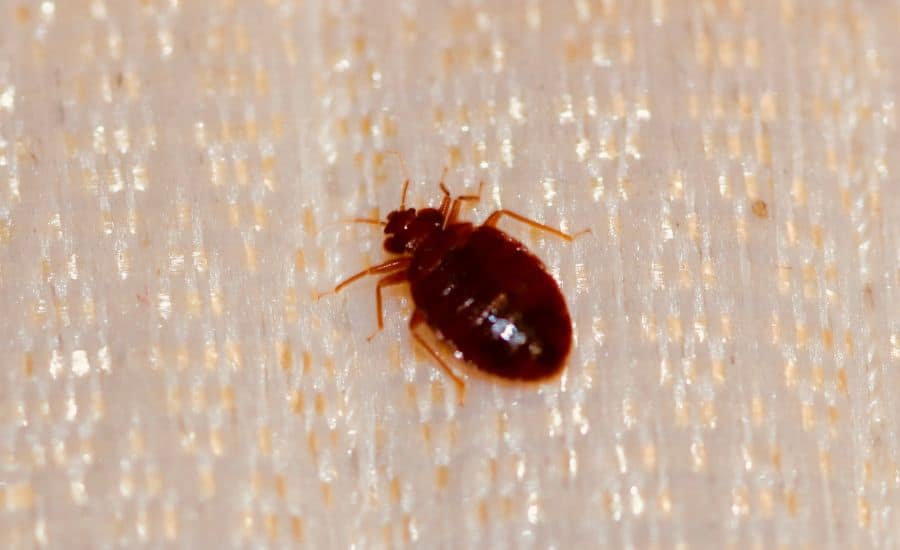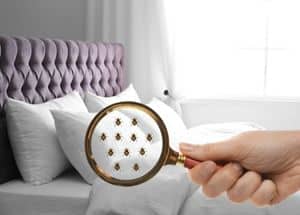Bed bugs are a big problem for people. You may not suspect that you have insects during the day. In the morning, you wake up with bite marks and itching all over your body. Pests are hard to find because of their small size and ability to hide in hard-to-reach places.
Wishing to solve the problem, people take ill-considered actions that do more harm than good. In this article, I will discuss the benefits and disadvantages of one of the most popular methods and answer the question: “Does alcohol kill bed bugs?”
[wpsm_titlebox title=”Does Alcohol Kill Bed Bugs?” style=”main”]
Alcohol is widely used for household purposes and is a well-known bed bug repellent. But in practice, you can waste time, ruin your favorite things and harm your health. Read in this chapter why alcohol is not as effective as some people say and what ways are more effective.
[/wpsm_titlebox]
Is alcohol effective against bed bugs?
To the question, “Does alcohol kill bed bugs’ eggs and insects themselves?” I would answer yes. But when people ask me, “Is alcohol effective in controlling insects?” I confidently answer no. Alcohol can kill the insect on direct contact. It eats away the bed bug’s outer shell, gets inside, and dries it out.
But despite its properties, this product will only help get rid of some insects at a time because you will not be able to provide direct contact. Bed bugs hide in hard-to-reach places, so you can’t detect all the insects. Also, one female can lay several hundred eggs, so if you kill a hundred or two hundred insects in one treatment, you are still in the same place.
[su_youtube url=”https://youtu.be/CJmCmn8RnY4″]
Does 91 alcohol kill bed bugs?
Pursuing the desire to get rid of insects as quickly as possible, people may buy the product with the highest concentration of alcohol. A solution with a concentration of 70% to 91% isopropyl works better on bed bugs. But as practice shows, even the most concentrated alcohol can’t destroy all insects on direct contact.
The difference between alcohol and rubbing alcohol
Both types of alcohol have strong antiseptic properties, so they are used in medicine. The main difference between medical alcohol and simple alcohol is the concentration. Alcohol contains no additives, so its concentration is 100%. Medical alcohol is a mixture of isopropyl alcohol and water, so the concentration may vary.
Rubbing alcohol is an ordinary medicine in the home medicine cabinet. It is used as an antiseptic, wound treatment, etc. Isopropyl alcohol is more dangerous for home use because of its chemical composition. However, it is used for technical purposes and is also added to fragrances, paints, cosmetics, and household chemicals.

Precautions for the use of alcohol
Using alcohol to exterminate bed bugs can be dangerous for people and animals. The liquid evaporates quickly, and its fumes are toxic in large quantities. If you spray alcohol and it gets in your eyes, it can cause blindness. In addition, alcohol is a flammable agent, so a fire can occur.
Concentrated alcohol can also damage your furniture and leave stains on your walls. Paint changes color from contact with isopropyl alcohol.
Simply put, the alcohol does not stay on the surface of the mattress for very long but evaporates almost immediately. Thus, it does far more harm to your health than good in the fight against bed bugs.
Other methods of bedbug control
There are alternative methods that can help exterminate insects in a faster and safer way.
- Vacuuming. It is necessary to vacuum not just the bed’s surface but all the crevices where insects can potentially hide.
- Washing things at high temperatures. Bed bugs die at 110-120 °F. Wash bedding as well as blankets and pillows if possible. Some quilts and pillows cannot be washed in the washing machine but should be dry-cleaned.
- Use a steam cleaner. It’s great if you have a steam cleaner in your house. You can use it before/after you vacuum for a lasting effect.
- Professional products. You can buy insecticides. They have a better effect than using alcohol. But chemicals should be used with great caution because they can be toxic.
- Turn to professionals. That will undoubtedly save you time, as professionals can rid your home of insects even in one visit.
Make a good habit of using pillows and mattress covers. Even a simple mattress cover that attaches to the bed legs will suffice. These things have a dense fabric that will be a barrier to insects.
[su_youtube url=”https://youtu.be/qmNlhbcsOxk”]
FAQ About Alcohol and Bedbugs
This section is for you if you don’t like to read much and need a quick answer.
What instantly kills bed bugs?
Insects instantly die in contact with insecticides contained in special sprays. The insects die at high temperatures, 110 °F or higher. That is why high-temperature washing or shampooing is considered an effective method of controlling insects.
Does alcohol kill bed bugs instantly?
Yes, it does. Alcohol kills the insect because it destroys the carapace and insides of the bedbug in contact with its body. But you can achieve this effect only with direct contact and a high concentration of alcohol.
Does 91% of rubbing alcohol kill bed bugs?
Yes, isopropyl alcohol 70 to 91% is more effective on insects than alcohol with a lower concentration. But you must use it with great caution because concentrated alcohol can ruin your belongings and harm your health and your pets.
Proceed With Caution
I understand the inconvenience of having bed bugs in your home. In desperation, you may be ready to use aggressive means to get rid of pests faster.
I hope my article helped debunk the myths about this popular remedy, and now you know how to act so as not to harm yourself in the first place. Try to resort to more humane and effective means, such as steam cleaning and washing items. Or, you can always entrust this challenging matter to professionals.
Have you ever used rubbing alcohol to get rid of insects? What do you think of it?
Also read:
References:
- How to Find Bed Bugs: https://www.epa.gov/bedbugs/how-find-bed-bugs
- Isopropyl alcohol: https://en.wikipedia.org/wiki/Isopropyl_alcohol
- Rubbing alcohol: https://en.wikipedia.org/wiki/Rubbing_alcohol

